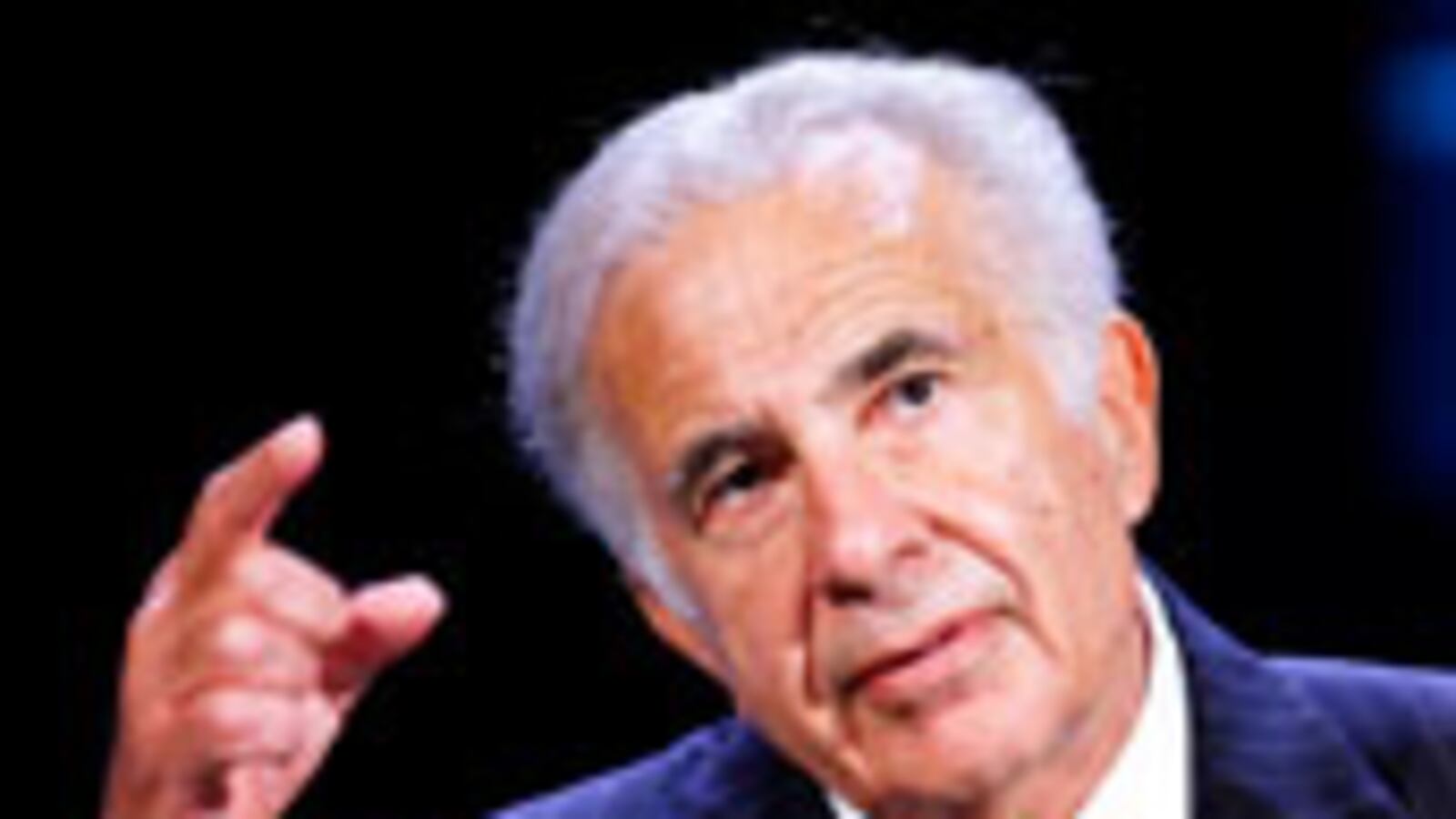
Lionsgate again rebuffed Carl Icahn's hostile bid, but a source tells The Daily Beast's Peter Lauria that some on the movie studio's board secretly wished it hadn't—and are angry over the studio's spending $75 million on a dud starring Ashton Kutcher.
Hollywood loves an underdog story, and right now there's no bigger one than film studio Lionsgate, under siege from corporate raider Carl Icahn, who has previously forced the likes of Biogen, Yahoo and Genentech into submission. Yesterday, the studio's board, in rejecting Icahn's most recent acquisition offer, essentially called Icahn clueless, a man attempting to buy Lionsgate "without offering a meaningful vision [and] without demonstrating a relevant track record of industry experience," according to CEO Jon Feltheimer's statement. Previously, Lionsgate rejected an offer by Icahn to acquire majority control of the studio, which specializes in horror flicks, as well as demands for board seats.
In a plot twist reminiscent of its infamous torture porn franchise Saw, however, a high-level source familiar with the company's operations says many of Lionsgate's own board members agree with Icahn's view that Feltheimer and vice-chairman Michael Burns have tolerated high overhead costs and charted a risky strategy. It's just that they have no other choice but to fight him since many of Icahn's criticisms were rubber-stamped by the board in the first place.
"If Icahn is a shareholder in your company, you have two choices: let him in the tent or let him kill you."
"Many of the board members are uncomfortable with the bigger risks Lionsgate is taking and feel that the studio is way too top heavy," says this source, who has spoken to some of Lionsgate's directors recently. "They're frustrated because they feel they are backed into a corner after unquestionably supporting Feltheimer and Burns for the last ten years."
Under the direction of Feltheimer and Burns, Lionsgate has expanded its television division with the purchase of the TV Guide channel and a partnership with Paramount Pictures and Metro-Goldwyn-Mayer for a new pay-television channel called Epix. Though both of those deals were approved by Lionsgate's board, this source and others said some of the studio's directors have, like Icahn, begun questioning whether the upside will ever materialize.
The "top-heavy" feeling stems from the fact that, despite being one of Hollywood's smallest studios, Lionsgate's four senior executives—Feltheimer, Burns, and co-chief operating officers Steven Beeks and Joseph Drake—all get paid CEO-level salaries. Feltheimer, for instance, made $4.1 million last year, while Drake made $1.7 million, with Burns and Beeks in between. This source added that other senior executives, like chief financial officer James Keegan, make $500,000 or more.
Representatives for Lionsgate and Icahn did not return calls for comment.
None of this would matter, of course, if Lionsgate's movies were scoring with audiences. But the studio's $31 million increase in theatrical revenue last year, to $223 million, was driven mainly by the fact that it released more films rather than produced bigger hits. "The Spirit," "From Paris with Love," and the last "Saw" sequel all generated less than $25 million at the box office, according to Boxofficemojo.com. Tyler Perry's movies has been standout success, but because of the way Lionsgate's deal with the comedian is structured, most of the money from those films goes to Perry himself. Feltheimer also mounted an expensive, unsuccessful Oscar campaign behind "Precious."
And while Lionsgate is set to release what could potentially be its biggest grossing movie to date next month with Kick-Ass, it has also spent what an insider said was close to $75 million on the Ashton Kutcher vehicle Killers that looks to be a dud. Moreover, the studio ruined its chance to work in partnership with Dreamworks on Old Boy, a film that had Steven Spielberg and Will Smith attached to it as director and star, respectively, because it wanted to be paid a premium for the rights instead of staying on board as a minority equity partner in the film, said a source with knowledge of the situation.
"Icahn has a more powerful argument right now because Lionsgate's movies have had a relatively mixed track record, Epix is nothing but an albatross, and TV Guide right now is a show-me story," says RBC Capital Markets analyst David Bank. "Icahn has a right to question the validity of their long-term strategy because so much has gone wrong. What Lionsgate needs right now is some decent movies to give credibility to its business plan."
Until that happens, however, Lionsgate's hostile posture is playing right into Icahn's hands.
"If Icahn is a shareholder in your company, you have two choices: let him in the tent or let him kill you," says a source who has been on the receiving end of one of Icahn's hostile pursuits. "What you can't do is fight him off. He loves a fight, and right now Lionsgate has pissed him off, so he's just taunting them."
But those taunts could turn into an actual takeover. Lionsgate's stock has fluctuated widely over the last few years, dipping below $5 and reaching as high as $11. While the stock closed trading yesterday at $5.99, many of Lionsgate's largest shareholders—among them Capital Research and Management, Steinberg Asset Management, and Feltheimer and Burns—bought shares or hold options valued at a higher price, meaning they would need more than the $6 per share Icahn is offering to capitalize on their investment. Burns was forced to sell more than 650,000 shares in 2008 to meet a margin call because Lionsgate stock had dipped too low.
Having already put millions into Lionsgate, the consensus among observers is that Icahn might bump his offer in the $8-$9 per share range. That price could not only entice Lionsgate's other shareholders to sell, but also give the studio's directors a reason—namely their fiduciary duty—to recommend the offer over the objections of Feltheimer and Burns.
Peter Lauria is senior correspondent covering business, media, and entertainment for The Daily Beast. He previously covered music, movies, television, cable, radio, and corporate media as a business reporter for The New York Post. His work has also appeared in Avenue, Blender, Black Men, and Media Magazine, and he’s appeared on CNBC, Bloomberg, BBC Radio, and Reuters TV.






